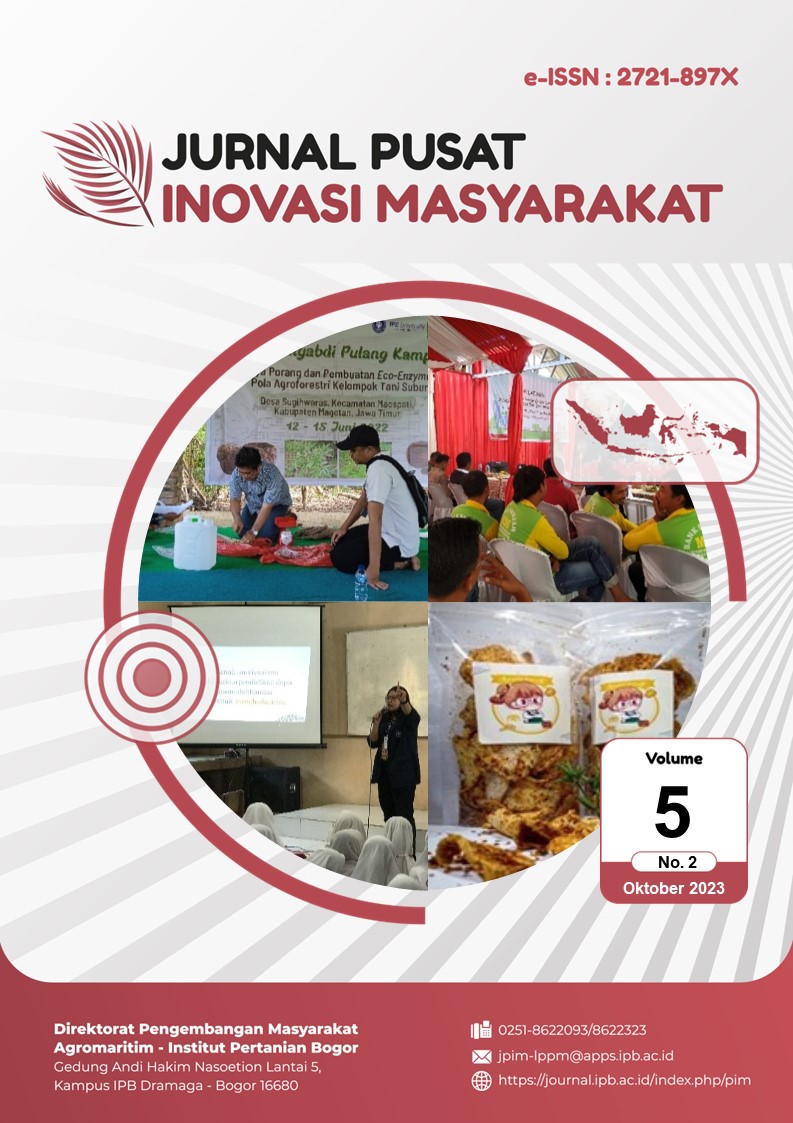Aplikasi Ekoenzim untuk Peningkatan Pertumbuhan Tanaman pada Sistem Agroforestri Jati di Desa Sugihwaras, Magetan, Jawa Timur
Abstract
The high population number of Indonesia has led to an increase in household organic waste. This organic waste has the potential to be processed into ecoenzymes that can enhance plant productivity. Currently, several farmers in Sugihwaras Village, Maospati District, Magetan Regency, East Java, face limitations in obtaining inorganic fertilizer (NPK) for their plants. This activity aimed to provide training in ecoenzyme production, analyze the change in farmers' knowledge about ecoenzyme production, and assess the effects of ecoenzyme application on the growth improvement of the teak (Tectona grandis) agroforestry system. This activity was carried out within the Subur Farmer Group in Sugihwaras Village, Magetan Regency, East Java, in 2022. The method used was a demonstration of ecoenzyme production, pre-test and post-test evaluations conducted on 20 members of the farmer group, as well as direct measurements of teak plant diameter growth and elephant grass plant height. The ecoenzyme production training in the teak agroforestry system enhanced the knowledge of the Subur Farmer Group, as shown by the average pre-test score of 45.1, while the average post-test score was 90.5. Based on the evaluation of the training activity, 74.3% of the farmer group members strongly agreed that the ecoenzyme production training was highly beneficial and aligned with their needs. Furthermore, according to the program evaluation, the ecoenzyme production training was deemed highly feasible for implementation with a score of 94%. The ecoenzyme production training provided to the Subur Farmer Group has been proven to enhance the partners' knowledge, increase the growth of teak plant diameter and elephant grass plant height, and holds the potential for enhancing the income of the community in Sugihwaras Village, Magetan Regency, East Java.
Downloads
References
Alim N, Simarmata MMT, Gunawan B, Purba T, Juita N, Herawati J, Firgiyanto R, Inayah AN. 2022. Pengelolaan Lahan Kering. Jakarta (ID): Yayasan Kita Menulis.
Avicienna A. 2020. Pengaruh etos kerja lingkungan kerja dan komitmen organisasi terhadap kinerja karyawan pada Bank Sulselbar Cabang Utama Makassar [skripsi]. Makassar (ID): Universitas Hasanuddin Makassar.
Badan Pusat Statistik. 2020. Penduduk Indonesia Hasil SP2020. Tersedia pada: https://www.bps.go.id Diakses pada 10 Februari 2021.
Clourisa N, Susanto A, Latief M, Dyah R. 2021. Pengenalan ecoprint guna meningkatkan keterampilan siswa dalam pemanfaatan bahan alam. Jurnal Inovasi Hasil Pengabdian Masyarakat (JIPEMAS). 4(36): 111–117. https://doi.org/10.33474/jipemas.v4i1.8974
Effendi I. 2016. Pengaruh pemberian pre-test dan post-test terhadap hasil belajar mata diklat hdw.dev.100.2a pada siswa smk negeri 2 lubuk basung. Jurnal Ilmiah Pendidikan Teknik Elektro. 1(2):81-88.
Hardati P. 2015. Pola persebaran outlet air minum isi ulang di Kabupaten Semarang. Jurnal Geograf. 12(1):75-144.
Jayani DH. 2019. Jumlah Penduduk Indonesia 269 Juta Jiwa, Terbesar Keempat di Dunia [internet]. Tersedia pada: https://databoks.katadata.co.id/datapublish/2019/04/29/jumlah-penduduk-indonesia-269-juta-jiwa-terbesar-keempat-dunia.
Kholifah S. 2022. Respons pertumbuhan tanaman Ylang-ylang (Cananga odorata forma genuina) terhadap pemupukan dan aplikasi ekoenzim di lapangan [skripsi]. Bogor (ID): Institut Pertanian Bogor.
Kriswantoro H, Nasser GA, Zairani FY, Nisfuriah L, Rompas JP, Dali D, Hasani B, Yulianto D, Sofian A. 2022. Pemanfaatan eco-enzim dari sampah organik rumah tangga untuk menjaga kesuburan tanah dan pengendali hama tanaman. Altifani Journal: International Journal of Community Engagement. 3(1): 7-11. https://doi.org/10.32502/altifani.v3i1.5355
Listiyani N. 2017. Dampak pertambangan terhadap lingkungan hidup di Kalimantan Selatan dan implikasinya bagi hak-hak warga negara. Al’Adl. 9(1): 67-86. https://doi.org/10.31602/al-adl.v9i1.803
Megah SIS, Dewi DS, Wilany E. 2018. Pemanfaatan limbah rumah tangga digunakan untuk obat dan kebersihan. Minda Baharu. 2(1): 50-58. https://doi.org/10.33373/jmb.v2i1.2275
Rijal M, Surati, Amir I, Abdollah A, Lessy AB, Ytatroman AS, Tanama N. 2021. Eco-Enzyme Dari Limbah Tanaman Maluku. Ambon (ID): LP2M IAIN Ambon.
Rochyani N, Utpalasari RL, Dahliana I. 2020. Analisis hasil konversi eco-enzyme menggunakan nenas (Ananas comosus ) dan pepaya (Carica papaya L.). Jurnal Redoks. 5(2): 135-140. https://doi.org/10.31851/redoks.v5i2.5060
Rosaliza M. 2015. Wawancara, sebuah interaksi komunikasi dalam penelitian kualitatif. Jurnal Ilmu Budaya. 11(2). https://doi.org/10.31849/jib.v11i2.1099
Sugiyono. 2017. Metode Penelitian Kuantitatif, Kualitatif, dan R&D. Bandung (ID): Alfabeta CV.
Tangapo AM, Kandou F. 2022. Edukasi pemanfaatan eko-enzim hasil fermentasi sampah organik rumah tangga menjadi hand-sanitizer di Kelurahan Meras Manado. The Studies of Social Science. 4 (1): 1-9. https://doi.org/10.35801/tsss.2022.4.1.38901
Widowati H. 2019. Komposisi sampah di Indonesia berdasarkan jenis [internet]. Tersedia pada: https://databoks.katadata.co.id/datapublish/2019/11/01/komposisi-sampah-di-indonesia-didominasi-sampah-organik.












